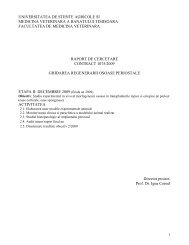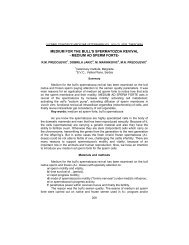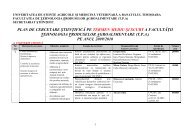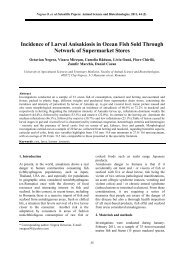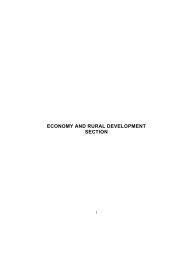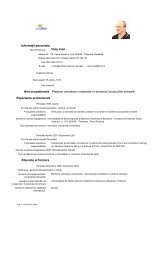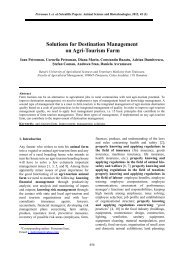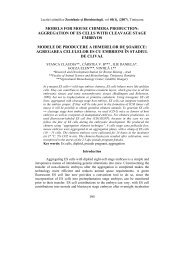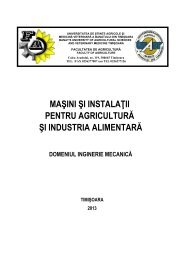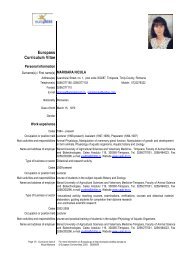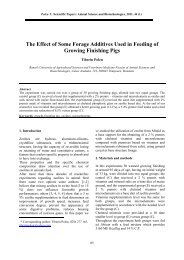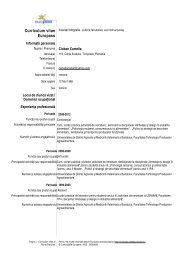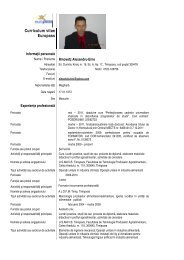journal of linguistic studies
journal of linguistic studies
journal of linguistic studies
Create successful ePaper yourself
Turn your PDF publications into a flip-book with our unique Google optimized e-Paper software.
…it is a little disappointing to learn that the general cultural influence <strong>of</strong> English<br />
has so far been all but negligible. The English language itself is spreading<br />
because the English have colonized immense territories. But there is nothing to<br />
show that it is anywhere entering into the lexical heart <strong>of</strong> other languages.<br />
The second observation is interesting to the same extent:<br />
Ironically, even the name <strong>of</strong> the English capital originates from Celtic Llyn +<br />
dun in which llyn is another Celtic word for “river” and dun stands for “a<br />
fortified hill”, the meaning <strong>of</strong> the whole being “fortress on the hill over the river”.<br />
Since most <strong>of</strong> inventions happened in English speaking countries, it is logical that<br />
most <strong>of</strong> the computer-related items have English names. However, in this global process,<br />
different target languages reacted differently, in the context <strong>of</strong> their openness to lexical<br />
influence <strong>of</strong> the English language. If we consider situation related to Montenegrin, our<br />
language received copious amount <strong>of</strong> lexical borrowings. One <strong>of</strong> the words from this<br />
corpus is a word “driver”. This word meaning “a person operating vehicle” did not have<br />
any sort <strong>of</strong> connexion to Montenegrin. However, together with information revolution,<br />
the word was incorporated into Montenegrin, with its orthographical form “drajver”. So,<br />
this word has changed its semantic field, from [+ alive] into [- alive] through the process<br />
<strong>of</strong> natural lexical evolution, and afterwards ended up as a part <strong>of</strong> Montenegrin, thus<br />
enabling our speakers to denote this new form <strong>of</strong> reality. This is what had happened to<br />
thousands <strong>of</strong> other model words prior to their arrival into Montenegrin. This is the<br />
ingredient which has created “computer jargon”.<br />
Jargon can be any informal and mainly spoken variety <strong>of</strong> a language serving the<br />
purpose <strong>of</strong> identification and communication within a particular socially defined group –<br />
according to their pr<strong>of</strong>ession, social status, age, etc. – where the members are brought<br />
together by a common interest, with a possibility <strong>of</strong> being territorially defined.<br />
Computer jargon is, for instance, new. If you listen to the communication, running<br />
along its normal course, between two young people who spend a lot <strong>of</strong> time in from <strong>of</strong> a<br />
computer, you can easily conclude it is full <strong>of</strong> computer jargon to that extent it may be<br />
completely unintelligible to someone outside the computer world.<br />
From these two paragraphs it can be easily concluded that digital technologies have<br />
lead to major changes within a number <strong>of</strong> languages, including there Montenegrin. These<br />
changes can be sometimes so radical that people who have not “updated” their vocabulary<br />
may find it difficult to understand their “lexically updated” compatriot. Computer jargon<br />
is now functioning as an independent <strong>linguistic</strong> part and possesses enough energy to<br />
acquire even more words. Through time, computer jargon has become a powerful<br />
<strong>linguistic</strong> tool, and it is not surprising most <strong>of</strong> the young people use it to make themselves<br />
different form all <strong>of</strong> those who are not into it.<br />
2. LOANWORDS IN MONTENEGRIN<br />
The Montenegrin language, throughout centuries, has been borrowing different<br />
lexical elements, not only from English, but from other languages as well. During the<br />
past, those were Hellenisms and Latinisms (since they are used all over the world they are<br />
sometimes called Internationalisms). We cannot deny the influence <strong>of</strong> Romance<br />
languages (mainly Italian and French) onto Montenegrin. Both <strong>of</strong> these languages were<br />
18



